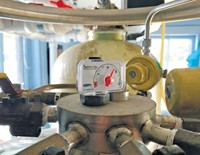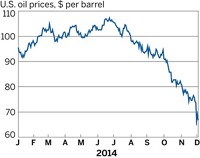Advertisement
Grab your lab coat. Let's get started
Welcome!
Welcome!
Create an account below to get 6 C&EN articles per month, receive newsletters and more - all free.
It seems this is your first time logging in online. Please enter the following information to continue.
As an ACS member you automatically get access to this site. All we need is few more details to create your reading experience.
Not you? Sign in with a different account.
Not you? Sign in with a different account.
ERROR 1
ERROR 1
ERROR 2
ERROR 2
ERROR 2
ERROR 2
ERROR 2
Password and Confirm password must match.
If you have an ACS member number, please enter it here so we can link this account to your membership. (optional)
ERROR 2
ACS values your privacy. By submitting your information, you are gaining access to C&EN and subscribing to our weekly newsletter. We use the information you provide to make your reading experience better, and we will never sell your data to third party members.
Business
Orange Crush
Tight (+)-limonene supplies put the squeeze on makers of citrus-based cleaners
by Melody M. Bomgardner
April 4, 2011
| A version of this story appeared in
Volume 89, Issue 14
At home in Ontario during the winter holidays, John P. Zanin kept his eye on the Florida weather report. He wasn’t planning a vacation. “I was watching a freeze in Florida, thinking ‘That’s not going to be good for January production,’ ” he recalls. Zanin, who works for a contract manufacturer, knew that one client’s citrus-based raw material was getting scarce.
The client had hired Zanin’s firm, Accucaps Industries, to make an encapsulated consumer cleaning product with a degreaser made from citrus. The active ingredient, (+)-limonene, is notable for its orange scent, but it’s also an industrial-strength solvent. The pleasant fragrance and designation as GRAS—generally recognized as safe—by the Food & Drug Administration have driven its demand for use in Earth-friendly cleaning products.
But the cost of (+)-limonene, which can be volatile generally, has skyrocketed in recent months, and now buyers of the raw material are nervous about even being able to get it. The reasons for the price spike include poor growing conditions, a years-long trend of declining Florida orange production, and rising demand. Some users also suspect that trade issues, and even the Gulf oil spill, have dried up supplies.
(+)-Limonene is a terpene that can be extracted from any citrus fruit, but it is most commonly made as a by-product of orange and grapefruit juice processing. “First, oranges are squeezed for juice. The orange oil that floats on the top is processed into food-grade (+)-limonene. Then the peel goes through a second pressing for more (+)-limonene. We sell everything we make; the demand is constant,” says Richard Pearl, head of regulatory affairs at Florida Chemical.
Florida Chemical, a leading U.S. (+)-limonene processor, has been notifying its customers that supplies are tight because of a lower than average Florida orange harvest caused by December’s freezes. Accucaps’ Zanin reports his costs rose 130% in three months. Pearl says volatility comes with the territory. “Just like any agricultural product, the supply goes up and down from year to year. However, the citrus crop is heavily weather dependent and is affected by hurricanes, rainstorms, and freezes.”
For the past three seasons, Florida’s orange growers have produced steadily declining quantities of oranges, according to the U.S. Department of Agriculture. Yield per acre has decreased, and fewer acres are under cultivation. The agency is now forecasting a 2011 orange harvest of 6.6 million tons, a 9% increase from last season but still 10% lower than 2008–09.
In early spring, before the Florida harvest takes over, (+)-limonene is produced from oranges grown in Brazil. USDA warns that drought in São Paulo state will impact the southern harvest as well. Still, supplies from growers in both hemispheres along with long-term contracts mean Florida Chemical has a steady supply for customers, Pearl says.
But scarcity means high prices. Kyle Beaman of Citrus Depot, a family-run manufacturer of (+)-limonene-based industrial cleaning products, says he’s paying as much as $4.00 to $5.00 per lb for the raw material, compared with $1.00 per lb in September. Beaman remembers a time when his firm paid around 18 cents.
Beaman has a different theory about the most recent run-up. “The rise in price was because of a large purchase from an oil company around September,” he says. Indeed, a Coast Guard spokeswoman with the Deepwater Horizon Joint Information Center confirms (+)-limonene is a component of a cleanser being used for onshore decontamination efforts.
Meanwhile, Zanin blames trade restrictions for the tight supply. Generally, (+)-limonene producers “can get crude orange oil from Brazil, but Brazil turned the taps off.” Pearl maintains that trade logistics have not changed.
If the price swings for (+)-limonene get to be too much for manufacturers, the chemical firm Rhodia is ready to help. The company has developed Rhodiasolv Infinity, a nonionic surfactant, from a waste stream of its nylon 6,6 manufacturing process. The surfactant helps make (+)-limonene water soluble and can reduce the amount required by 50–80% without harming its effectiveness, according to the company.
So makers of natural, citrus-based cleaners face rising costs for their preferred raw material, or possibly a reformulation to take advantage of a synthetic product. Beaman says he and his family are looking into additional business opportunities. Zanin is holding steady but notes that it is a problem when a formerly cheap, all-natural by-product becomes more expensive than petroleum. “Everyone needs gas; not everyone needs a cleaner with (+)-limonene in it,” he points out.






Join the conversation
Contact the reporter
Submit a Letter to the Editor for publication
Engage with us on Twitter